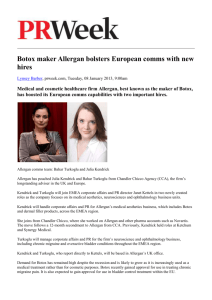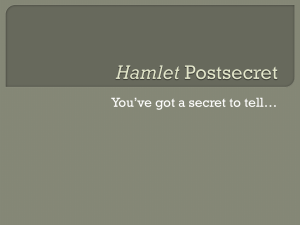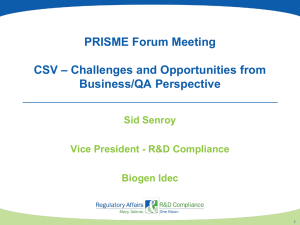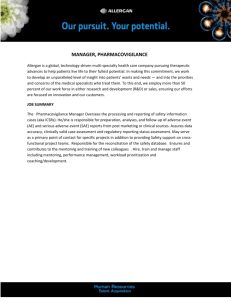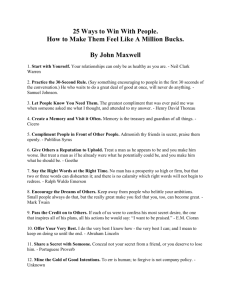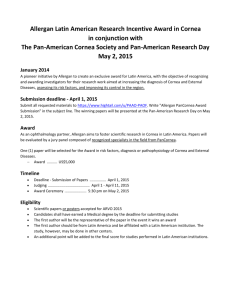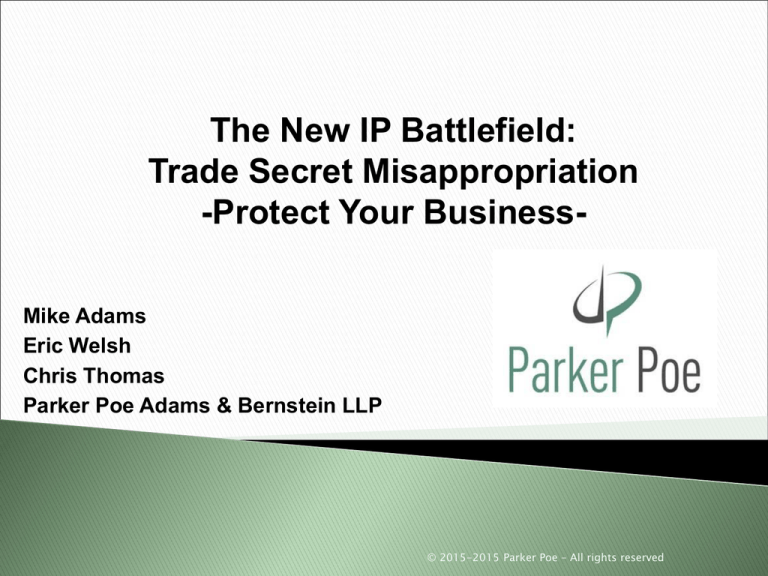
The New IP Battlefield:
Trade Secret Misappropriation
-Protect Your BusinessMike Adams
Eric Welsh
Chris Thomas
Parker Poe Adams & Bernstein LLP
© 2015-2015 Parker Poe – All rights reserved
“[Things
spoken are] forgotten
... passed by—not noticed in a
private conversation—but once
put your words in writing ...
they stand as a living & eternal
Monument against you.”
© 2015 – All rights reserved
2
© 2015 – All rights reserved
3
© 2015 – All rights reserved
4
© 2015 – All rights reserved
5
© 2015 – All rights reserved
6
© 2015 – All rights reserved
7
One year later the driver of an SUV ran the
stop sign, was hit by a train, and two
passengers died and another was seriously
injured
A lawsuit was filed
Defendant has a video camera on its train
showing clearly that the driver ran the stop
sign
But it also has this email
© 2015 – All rights reserved
8
The email has nothing to do with trade
secrets
But it is a classic example of a dumb email:
• (1) it is from the Director of Grade Crossing
Safety
• (2) its subject is about the safety of a
crossing which an employee claims is
“illegitimate”
• (3) it references a clearly off-hand comment
that the crossing is so unsafe that people
are taking bets as to when someone might
get hit
© 2015 – All rights reserved
9
Another Example: after a lawsuit was filed, and after
having received a litigation hold letter and discovery
requests asking for production of any documents
that referred to the plaintiff by name, the National
Director of Sales for the defendant sent the following
email along with information the plaintiff would later
claim were trade secrets:
© 2015 – All rights reserved
10
Another example: Email requesting that a company’s
sales force obtain “select competitive samples and
pricing information” at an industry trade show and the
response from one of the sales reps:
© 2015 – All rights reserved
11
Another Scenario: Imagine a Company President asks the V.P. of
Marketing for the sales of a group of the company’s largest customers.
Rather than taking the time to obtain the information from the different
sources, the V.P. of Marketing decides the easiest way to get this information
is to ask a friend who works for the Company’s largest competitor and then
sends back the following email to the Company president:
© 2015 – All rights reserved
12
Next, he sends a series of emails to his friend
at the Company’s largest competitor:
© 2015 – All rights reserved
13
She sends him the information.
In another email he requested different information:
When there is a group of companies in a particular industry
and they are competing with each other for the same
will
customers, people
(a) move between those
companies and (b) continue to communicate with each other
They will also share information that their employers deem to
be confidential, proprietary and/or trade secrets
Yes, emails like this are being sent by people in
your companies all the time
© 2015 – All rights reserved
14
There are three legal concepts to protect
ideas—trade secret, patent, and contract,
(e.g., confidentiality agreement)
Patents and contracts require a single act
Trade secrets depend upon a continuing
course of conduct
© 2015 – All rights reserved
15
© 2015 – All rights reserved
16
“Trade secret” means business or technical information,
including but not limited to, a formula, pattern, program,
device, compilation of information, method, technique,
or process that:
derives independent actual or potential commercial value;
from not being generally known or readily ascertainable through
independent development or reverse engineering; and
is the subject of reasonable efforts to maintain its secrecy.
N.C. Gen. Stat. § 66-152
© 2015 – All rights reserved
17
The following categories of information, depending
upon the facts, have sometimes been found to be (or
not to be) trade secrets in North Carolina:
• cost history information
• price lists
• pricing formulas
• bidding formulas
• customer lists
• compilation of business information (made up of
preferred customer pricing, employees' salaries,
equipment rates, fleet mix information, budget
information and structure of the business)
© 2015 – All rights reserved
18
“Three can keep a secret, if two of
them are dead.”
© 2015 – All rights reserved
19
© 2015 – All rights reserved
20
One of the battlefields in trade secret
litigation is whether the information at issue
was subject to reasonable efforts to maintain
its secrecy
What constitutes reasonable efforts to protect
trade secrets is fact specific and decided on a
case-by-case basis
That means your job is to create the best
arguments for your side and to eliminate the
obvious arguments for the other side.
© 2015 – All rights reserved
21
Trade Secret Theft Costs US Companies an Estimated $300 billion
per year
60% of Employees Surveyed Admitted to Stealing Company
Information
Over the past 30 years, trade secret litigation in federal courts has
doubled roughly every decade, while federal litigation has
decreased overall
Over the past 20 years, trade secret litigation in state courts has
increased at a rate faster than that of litigation in general
February 2013 directive from the White House putting a priority on
mitigating corporate espionage and theft of U.S. trade secrets by
foreign countries
© 2015 – All rights reserved
22
•
Most intellectual property is digital
•
Most, if not all, of your employees bring cameras and
recorders to work every day
•
Every single one of your employees with Internet access
can likely access a personal web-based email account
•
Every single one of your employees can carry an easily
concealable drive in their pocket that has massive storage
capabilities
© 2015 – All rights reserved
23
© 2015 – All rights reserved
© Parker Poe Adams & Bernstein LL P 2010
24
© 2015 – All rights reserved
© Parker Poe Adams & Bernstein LL P 2010
25
© 2015 – All rights reserved
© Parker Poe Adams & Bernstein LL P 2010
26
© 2015 – All rights reserved
27
http://www.lexisnexis.com/applieddiscovery/
lawlibrary/whitepapers/adi_fs_pagesinagigaby
te.pdf
© 2015 – All rights reserved
28
© 2015 – All rights reserved
29
• Jury awarded MGA $88.5 million. Trial judge remitted it to
$85 million, and awarded $2.5 million in attorneys fees
and $85 million in punitive damages for a total of $172
million for trade secret misappropriation.
• Ninth circuit vacated the award on procedural grounds
(non-compulsory counterclaim in a reply) but upheld a
$137 million copyright infringement verdict.
• So what did Mattel do?
© 2015 – All rights reserved
30
“For years, the company's senior management encouraged
employees to use false pretenses to access competitors'
private displays at international toy fairs and improperly
acquire competitive information, including price lists,
advertising plans, and unreleased product attributes. Mattel
disseminated the improperly acquired information through
internal memoranda, see, e.g., TX 9275, and company-wide
presentations, see Trial Tr., dated March 22, 2011, Vol. I, at
31:2–7; praised the employees that committed the
wrongdoing, see TX 27464–158.”
© 2015 – All rights reserved
31
“An internal Mattel document instructed employees to
create false identifications before attending toy fairs, using
a “home phone number or [ ] a fake number [but not] your
Mattel number.” TX 36028. … [M]embers of the company's
“Market Intelligence” department used false identifications
and posed as retailers to gain access to MGA's private
showrooms and at least one former executive admitted that
he allowed Mattel’s employees to use his home address.
Trial Tr., dated March 24, 2011, at March 23, 2011, Vol. I, at
11:16–12:18; Trial Tr., dated March 22, 2011, Vol. I, at 32:21–
37:24.”
© 2015 – All rights reserved
32
“Society has an interest in deterring reprehensible conduct
of this kind. But that interest in deterrence is not at its
strongest here, since other members of the close-knit toy
industry have been alerted to Mattel’s misconduct as a
result of this litigation and are likely to cast a wary eye
towards their competitor in the future. Nor does Mattel’s
use of cheap fake business cards, silly nicknames, and
amateurish tactics in a futile effort to stave off legitimate
competition evoke a strong desire to punish. That one of
California's largest companies abandoned innovation and
resourcefulness for bumbling fraud evokes disappointment
instead.”
© 2015
– All rights
reserved
© Parker Poe Adams
& Bernstein
LL P 2010
33
• Allergan makes Botox
• Merz makes Xeomin, a Botox competitor
• Spring 2010, Merz starts interviewing sales reps for
Xeomin, including Allergan reps, in anticipation of FDA
approval of Xeomin
• Allergan GC mails a letter to Merz GC to the effect that
Allergan knows employees are being interviewed and
“we are watching you”
• July 2010, Merz hires 10 Allergan Botox sales reps
• August 4, 2010, Allergan seeks TRO re: trade secrets
• Merz says it has nothing and Judge denies TRO
© 2015 – All rights reserved
34
Merz’s protection measures:
• The new employees signed employment agreements
stating that they would not use confidential information
• At a national sales meeting, Merz Aesthetics General
Counsel gave all sales representatives a presentation on
compliance and confidential information.
• Merz’s asked employees to search their files and return
any materials that they might have received in connection
with the hiring of any former Allergan employee
• Merz contacted the eight known Allergan sales
representatives and instructed them not to send anything
Allergan-related to Merz and not to delete anything from
their personal computers or media storage devices
© 2015 – All rights reserved
35
Merz’s protection measures:
• Merz gave a PowerPoint presentation to its new sales
force which discussed avoiding the inadvertent
acquisition or use of former employer information
• At an all-company launch meeting in early September,
Merz Pharma’s in-house counsel gave another
presentation to the entire sales force
• Merz hired a forensic computer consultant who did a
poor search for documents and none of the following
came out until a year and a half after the TRO hearing
© 2015 – All rights reserved
36
Allergan’s protection measures:
• Pre suit letter and immediate TRO discussed above;
• All Allergan employees signed employment agreement
which included: “In general, any information relating [to]
investigational or marketed products, research or
manufacturing processes, business studies, business
procedures and finances which has not been made public
shall be considered confidential.”
• Upon joining Allergan, and periodically thereafter, the
Individual Defendants were all provided with, and required
to review, Allergan’s Employee Handbook and Code of
Business Ethics containing standard trade secret
provisions
© 2015 – All rights reserved
37
Allergan’s protection measures:
• Allergan began a forensic examination of the laptops and
network activity of the sales reps
• They accessed and sent to their personal email accounts
numerous documents and electronic files before giving
notice to Allergan that they were leaving the company to
join Merz Aesthetics
• For example, Excel spreadsheet containing the entire
nationwide list of Allergan’s nearly 24,000 physician
customers for Botox, including the identities of those
customers, contact information for each, details
concerning sales volumes and future targets was sent
after one sales rep signed her employment agreement
with Merz
© 2015 – All rights reserved
38
What Allergan Found:
• Allergan sales training documents, including Allergan’s
strategy for competing with Merz marked with the legend
“For Sales Training Purposes Only. Do Not Duplicate or
Distribute.”
• A 24-page PowerPoint presentation titled “Competitive
Framework: Evaluating the Competitive Dermal Filler
Market.”
• An Allergan report of every sales representative by name,
region or territory covered, specific actual sales amounts,
and a numerical ranking of each representative
© 2015 – All rights reserved
39
What Allergan Found:
• One sales rep copied her back-up files and other Allergan
files to a 2-terabyte external hard drive
• Another copied approximately 30 files from his Allergan
laptop to a portable USB drive and, in addition, accessed
another 148 distinct files.
• etc. etc. etc.
© 2015 – All rights reserved
40
What Merz had done with the inforation:
• It turns out that Merz had confidential Allergan documents
going back to March 2010, four months before these
employees were hired
• PowerPoint presentations sent by a vice president to the
President of Merz
• Excel spreadsheets sent by a regional manager to the
National Sales Manager
• A directory of Allergan employees sent in an email with
the comment “Please keep this to yourself.”
• Employees called their former colleagues for information:
“What????? Come on! You work for the competition
now..[sic] sort of.” She eventually obtained the materials
from a different current Allergan employee
© 2015 – All rights reserved
41
So what happened:
• National Sales Manager sent a broadcast email to new
hires “Competitive info – For those of you coming from a
competitor or former competitor, please get as much info
as you can on KOL’s [Key Opinion Leaders], sales
numbers, office volume, product info etc….. [sic] This will
be very valuable to everyone in the region.”
• The email states that he “BCC’d everyone on this email so
that [they] may remain anonymous and exit [their] current
positions without any problems.”
• A new sales rep responded [I have a] “flashdrive loaded
up with some key account documents, SPP/payer info,
some [sic] BOTOX slide sets, etc.”
© 2015 – All rights reserved
42
So what happened:
• Another responded with an email attaching three
confidential Allergan documents (the “Xeomin Training
Modules”) with a cover note stating that “[t]his is what
Allergan is using to prepare for real competition.”
• The Xeomin Training Modules are marked on each page
as “For Internal Use Only” and “For your Information
Only. Do Not Duplicate, Detail, Distribute, or Use in Any
Promotional Manner.”
© 2015 – All rights reserved
43
So what happened:
© 2015 – All rights reserved
44
So what happened:
© 2015 – All rights reserved
45
So what happened:
Who won?
© 2015 – All rights reserved
46
© 2015 – All rights reserved
Your company’s information is vulnerable
Your company is vulnerable to being accused of
misappropriating your competitors’ trade secrets
Some people are bad
Some people are careless
Some people have judgment and intellectual challenges
Human nature is prone to short cuts and vindictiveness
Technology makes it easier to misappropriate and easier to
prove misappropriation
One day, you will be asked to account for your actions
© 2015 – All rights reserved
48
Publication of the secret destroys its value as such
because a trade secret is of value only because it is a
secret, and only so long as it remains a secret.
Don’t
Don’t
Don’t
Don’t
Don’t
Don’t
Don’t
disclose to third parties in absence of an NDA
publish on website
include in patent
include in deposit materials with copyright application
describe in industry trade magazines
describe at trade show or customer demo
show on tours of production facility
© 2015 – All rights reserved
49
“An ounce of prevention is worth at least a pound of cure.”
Confidentiality Procedures:
• Implement and follow a corporate policy regarding confidential
information/trade secrets (policy should be in writing and cover
computer rights and access)
• Entrance and Exit Interviews and Evaluations
• Confidentiality agreements (CDA’s) with employees
• Properly drafted non-compete provisions
• Confidentiality agreements with third-parties
•
•
•
•
Vendors
Suppliers
Customers
Joint Venture or Business Partners
© 2015 – All rights reserved
50
“An ounce of prevention is worth at least a pound of cure.”
Physical Security Measures:
•
•
•
•
•
•
•
Guarded entrance
Locked doors or filing cabinets
Control visitor access
Prohibiting photography
Signage indicating confidential areas
Use pre-mixed or code-named ingredients
Label confidential documents
• Audit compliance
© 2015 – All rights reserved
51
“An ounce of prevention is worth at least a pound of cure.”
Technology Security Measures:
• Restrict access (VPN, Wi-Fi, document groups, etc.)
• Passwords and Encryptions
• Policies for USB devices and backup drives
• Monitor and audit access
© 2015 – All rights reserved
52
“An ounce of prevention is worth at least a pound of cure.”
Corporate Measures:
• Educate key managers on trade secret protection
• Be candid about what is occurring
• Ask for input on how to improve systems
• Create a culture of accountability
• Limit access/distribution of secret information
© 2015 – All rights reserved
53
Who should help formulate these policies:
•
•
•
•
•
•
•
•
IT
HR
R&D
M&A
Sales and Marketing (good luck)
Accounting
Risk management
Security
Do not just write a policy—put it into practice. Speak at the
annual sales meeting
© 2015 – All rights reserved
54
Review the new employee hiring process;
Understand your IT Controls;
Review your confidentiality and non-disclosure forms;
Decide what you consider to be your most sensitive
information or most important trade secrets and learn
how they are handled.
© 2015 – All rights reserved
55
What can you do to avoid claims of misappropriation
against your business?
• Company policies against efforts to obtain competitors’
confidential information (e.g. bounty programs)
• Agreements with new employees
• Policies that new employees may not use computers,
phones or other devices used in prior employment with
competitors
• Tight confidentiality and non-disclosure agreements
• Identify obvious risk situations
• Education
• Corporate culture
© 2015 – All rights reserved
56
• Investigation
• Immediate action is critical
• preserve evidence
• minimize further damage
• Retain legal counsel as soon as you discover this
misappropriation.
© 2015 – All rights reserved
57
© 2015 – All rights reserved
58
© 2015 – All rights reserved
59

